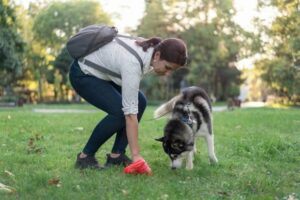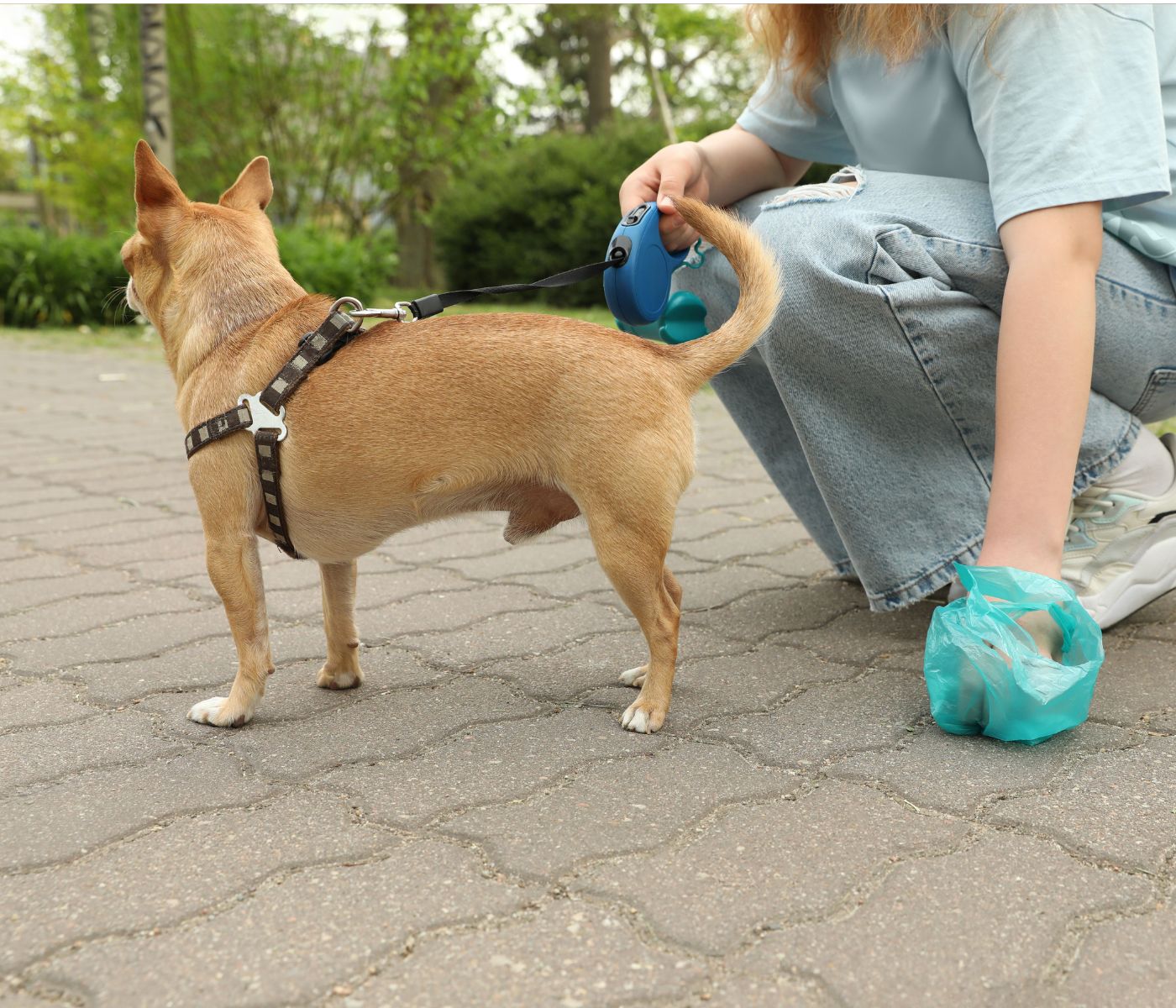It’s a question many dog owners have asked themselves: why does my dog poop so much on walks?
Many factors affect how often a dog defecates, including diet, exercise, age, and health.
Dogs typically poop once or twice a day, but some may go more or less often. If your dog is pooping more frequently on walks, it could be due to excitement, anxiety, or a change in diet.
If your dog is pooping more frequently on walks, you can do a few things to help.
- First, make sure that your dog is getting enough exercise. A tired dog is a good dog!
- Secondly, try to keep your dog walks calm and relaxed. If your dog is anxious or excited, it may be more likely to go to the bathroom.
- Finally, make sure you are feeding your dog a high-quality diet. A healthy diet will help keep your dog’s digestive system functioning correctly.
In this blog post, we’ll explore five possible explanations and offer some solutions to help you keep your dog from pooping on walks.
Why Does My Dog Poop So Much on Walks?

There are a few reasons your dog may be pooping more on walks than usual. It could be a dietary issue; they may be anxious or excited, have a medical condition, or need to poop more frequently. Let’s explore each of these possibilities in more detail.
- Diet: If your dog is eating more food or a different type of food, it may poop more. This is especially true if they are eating more fiber-rich foods or treats. Some dogs also poop more when they eat chicken or other poultry products.
If you’ve recently changed your dog’s diet and are pooping more on walks, try switching back to their old food to see if that helps.
- Anxiety or excitement: Dogs can sometimes get anxious or excited when on walks, leading to them pooping more frequently. If your dog seems stressed or nervous on walks, try changing the route you take or the time of day you walk them.
You might also want to try desensitization training to help them relax around people and other animals.
- Medical condition: Several medical conditions can cause an increased frequency of defecation, such as colitis, inflammatory bowel disease (IBD), and parasites.
If you think your dog’s increased pooping on walks could be due to a medical condition, make an appointment with your veterinarian for a check-up and diagnosis.
- Poop needs to come out: Sometimes, dogs need to poop more frequently than usual – this could be due to changes in their diet, exercise routine, stress levels, etc. If your dog is generally healthy but is pooping more often than usual, there’s no need to worry.
Ensure they have access to plenty of fresh water and quality puppy pads or grassy areas for potty breaks.
- Excitement during walks: Many dogs love going for walks because it’s a chance to explore new smells and sounds! This excitement can sometimes lead to increased excretion – especially if you didnt walk your dog regularly before you got them.
To help prevent this from happening too often, make sure you walk your dog regularly (at least once per day) and keep an eye on their body language cues, so you know when they need to go potty.
If your dog is pooping more frequently on walks than usual, there’s likely no cause for concern. However, if you’re unsure about why your dog is pooping more or if you think there may be a medical issue, it’s always best to consult with your veterinarian.
How Often Should a Dog Poop Each Day?

The answer to this question depends on a few factors, including your dog’s diet, age, and activity level.
On average, most dogs will poop 2-5 times per day. Puppies or dogs eating a high-protein diet may poop more frequently than this. Older dogs or those on a low-protein diet may poop less often.
More active dogs will also generally poop more frequently than sedentary dogs. It is because physical activity speeds up food movement through the digestive system.
Some health conditions can cause a dog to poop more (or less) frequently than usual.
If you’re concerned about your dog’s bathroom habits, it’s always best to talk to your veterinarian.
Should I be worried if my dog is pooping a lot?

If your dog is pooping a lot, it could be a sign of an underlying health condition. If your dog is otherwise healthy and has no other symptoms, you may need to increase its fiber intake.
However, if your dog is pooping a lot and also has other symptoms, such as weight loss or diarrhea, you should take them to the vet.
You should also be concerned if your dog is having difficulty defecating. It could be a sign of constipation caused by several things, including a lack of fiber in the diet.
If your dog is constipated, it may strain to poop, have hard stools, or be unable to defecate.
If you think your dog may be constipated, you should take them to the vet.
Medical Issues of Dogs Pooping Too Much:
A few medical issues could result in your dog pooping too much on walks. If you think your dog may have any such issues, take them to the vet for further examination.
- Intestinal parasites are tiny creatures living in the intestines and can cause diarrhea. If your dog has intestinal parasites, they will need to be treated with medication prescribed by your veterinarian.
- Exocrine pancreatic insufficiency (EPI): This is a condition where the pancreas doesn’t produce enough enzymes to digest food properly. Dogs with EPI often have loose, oily stools and may need to be fed a special diet.
- Inflammatory bowel disease (IBD): IBD is a condition that causes inflammation of the gastrointestinal tract. It can lead to weight loss, vomiting, and diarrhea. Treatment for IBD typically includes medication and special diets prescribed by your veterinarian.
- Food allergies or intolerance: Dogs can be allergic or intolerant to certain ingredients in their food. This can cause stomach upset, diarrhea, and vomiting. If you think your dog may have a food allergy or intolerance, speak to your vet about possible dietary changes.
How Can I Prevent My Dog from Pooping on Walks?
If your dog is pooping too much on walks, there are several things you can do to implement and prevent it. Here are five possible solutions:
- Change your route: If you usually walk your dog in the same area, try changing your route. This can help to stimulate their digestive system and may help to reduce how often they need to poop.
- Add some fiber to their diet: Adding fiber to your dog’s diet can help to bulk up their stools and make them less likely to need to go as often. Try adding some pumpkin or other high-fiber food to their meals.
- Take them out more frequently: If your dog is pooping too much on walks, it may be because they’re holding it in for too long between bathroom breaks. Try taking them out more frequently, especially before and after meals.
- Get them checked by a vet: If you’re concerned that your dog is pooping too much, it’s always best to get them checked out by a vet. They can rule out any medical causes and advise on the best course of action.
- Try a different type of leash: If your dog is pooping while on a leash, it may be because they feel restricted or uncomfortable. Try using a different type of leash, such as a harness or head collar, which may provide more comfort for them while walking.
FAQs
Q: Does walking make your dog poop?
A: It is not the act of walking that makes dogs poop, but rather what they consume before the walk. If a dog has just eaten or drank a lot of water, they are more likely to need to relieve itself. Walking also helps stimulate the bowels, so walking your dog after eating is a good idea.
Q: How often should a dog poop each day?
A: The frequency of bowel movements varies from dog to dog and is usually influenced by diet. Most adult dogs will have 1-2 bowel movements per day. Puppies and young dogs may have up to 4 stools per day. If your dog has more than two stools per day or if its stool is very soft, you should consult your veterinarian.
Q: How long after eating should I take my dog out to poop?
A: It generally takes around 30 minutes for the food to travel through a dog’s digestive system and be ready to be expelled as waste. However, this timeframe can vary depending on the size of the meal and the individual dog’s metabolism.
So, if your dog has just eaten a large meal, it’s best to wait an hour before taking them on a walk. Otherwise, you risk them having an accident on your walk!
Q: How long can a dog hold their poop?
A: A healthy adult dog can typically hold their bowels for 8-10 hours without needing to go outside. However, puppies and elderly dogs may need to go more frequently (every 4-6 hours). If your dog is holding their bowels for longer than usual (12+ hours), this could indicate constipation or another health issue, so you should consult your veterinarian.
Q: What do dogs smell before they poop?
A: Dogs have anal sacs near their anus that release a foul-smelling liquid when defecating. This liquid contains pheromones that help communicate information about the individual dog’s identity and health status to other nearby dogs.
